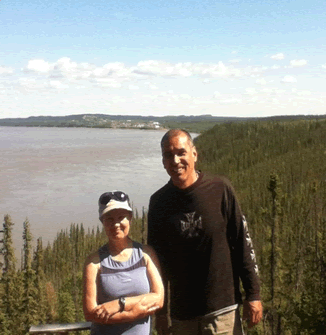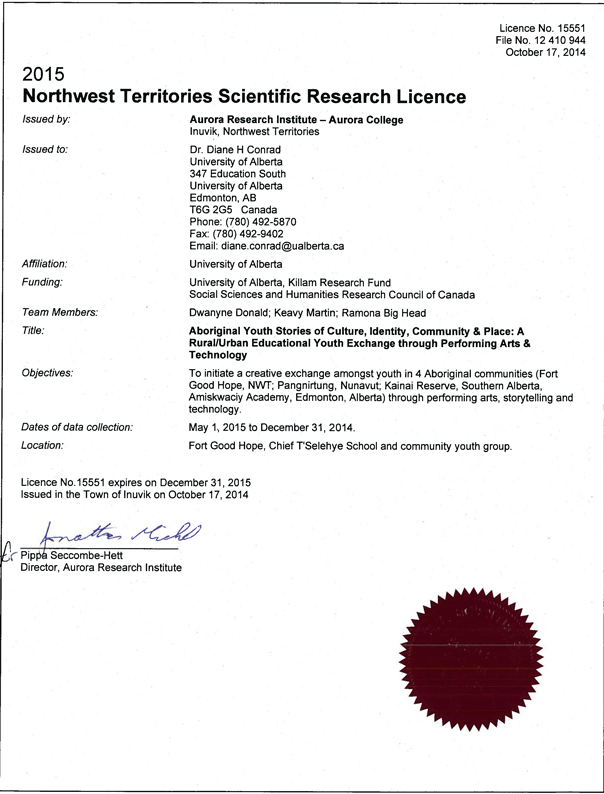
(SSHRC Partnership Development Grant submitted Fall 2014)

Diane & Dwayne in Fort Good Hope, NWT
Photo credit: Alexie Orlias
In collaboration with colleague Dr. Dwayne Donald, and others, initial funding has been acquired from U of A’s Killam
Cornerstone and Kule Institute for Advanced Study grants.
Summary
Challenges: Education for Aboriginal students across Canada is in dire need of enrichment given the legacy of
residential schools and the persistent failure of mainstream curriculum to engage Aboriginal learners. Based on
most recent statistics specific to Aboriginal youths' high school completion, "40% of Aboriginal people aged 20
to 24 did not have a high-school diploma, compared to 13% among non-Aboriginal Canadians. The rate was even
higher for First Nations living on reserve (61%) and for Inuit living in remote communities (68%). These numbers
are distressing given the importance of a high-school diploma in the pursuit of further education, training and
employment" (Canada Council on Learning, 2009, p. 6). For these reasons, the education of Aboriginal students
has become a national priority and there is increasing demand for teachers who understand the pedagogical
implications of working with Aboriginal students. What is urgently called for is engagement rooted in Indigenous
ways of knowing and histories to redress past inequities, nurture educational success and find practical solutions
for meeting Aboriginal learners' diverse educational needs. Enhancing Aboriginal education has implications for all
Canadians for repairing and renewing Aboriginal-Canadian relations, for economic and ecological sustainability,
towards building our successful shared future.
Objectives: How can partnership development between university researchers, Aboriginal community schools,
and organizations that support them for the co-creation of curriculum and knowledge mobilization help nurture
the educational experiences and successes of Aboriginal learners? The objectives of our study are to 1) establish
sustainable collaborations between three diverse Aboriginal community schools and organizations that support
those schools; 2) undertake research development of co-created curriculum models, through arts, digital technology
and youth exchange, for nurturing the educational success of Aboriginal learners; 3) build capacity within the
communities to utilize and further develop the emergent curricular models; 4) disseminate learning from the study
to schools, school authorities, and teacher preparation programs locally, nationally and internationally; 5) develop
other partnerships for research into the education of Aboriginal learners.
Partnership: Our collaboration involves University of Alberta researchers including a leading Indigenous scholar;
three diverse First Nations schools including a community school in the Northwest Territories; a school on a Southern
Alberta reserve, with the Principal as research collaborator; an urban Aboriginal school in Edmonton, Alberta; two
school boards; a community council; a Northern community college; and a government department. Relationship
building activities and consultation processes undertaken with the communities including a meeting of representatives
from all three communities have indicated that education is a priority for all partners; they have identified the
partnership development as aligning with their established goals. Partners will provide leadership for the research;
analyze and evaluate the processes and products of the curriculum exploration, attuned to the specific cultural contexts
of their communities and the educational goals of their regions. We acknowledge the diversity and richness of
Indigenous cultures and knowledges, the support offered Aboriginal learners through maintaining cultural identity,
and their need to work against the effects colonization for success that encompasses more than high school attainment.
Conrad, D., Donald, D. & Krahn, M. (submitted, May. 2015). An Aboriginal youth curriculum exchange through arts & technology
– Stories of culture, identity, community & place. International Association for the Advancement of Curriculum Studies. Ottawa, ON.
Conrad, D., Donald, D. & Krahn, M. (Feb. 2015). Provoking understanding through community mapping curriculum inquiry,
Provoking Curriculum. Vancouver, BC.
Donald, D., Conrad, D. & Krahn, M. (May, 2014). Addressing Aboriginal education: Conditions, viewpoints, and aspirations
across two diverse communities. CSSE. St. Catharines, ON.
Conrad, D., Donald, D. & Krahn, M. (March 2014). Attending to community contexts: Understanding Aboriginal education
in three diverse communities. Faculty of Education, UA.
Northwest Territories Research License
